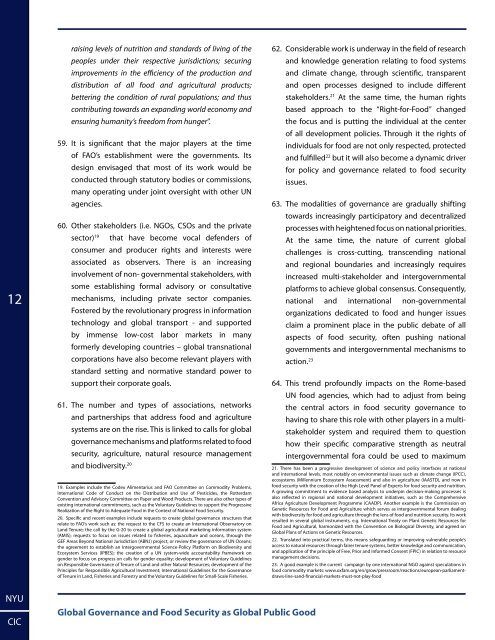Global Governance and Food Security as Global Public Good
Global Governance and Food Security as Global Public Good
Global Governance and Food Security as Global Public Good
You also want an ePaper? Increase the reach of your titles
YUMPU automatically turns print PDFs into web optimized ePapers that Google loves.
12raising levels of nutrition <strong>and</strong> st<strong>and</strong>ards of living of thepeoples under their respective jurisdictions; securingimprovements in the efficiency of the production <strong>and</strong>distribution of all food <strong>and</strong> agricultural products;bettering the condition of rural populations; <strong>and</strong> thuscontributing towards an exp<strong>and</strong>ing world economy <strong>and</strong>ensuring humanity’s freedom from hunger”.59. It is significant that the major players at the timeof FAO’s establishment were the governments. Itsdesign envisaged that most of its work would beconducted through statutory bodies or commissions,many operating under joint oversight with other UNagencies.60. Other stakeholders (i.e. NGOs, CSOs <strong>and</strong> the privatesector) 19that have become vocal defenders ofconsumer <strong>and</strong> producer rights <strong>and</strong> interests were<strong>as</strong>sociated <strong>as</strong> observers. There is an incre<strong>as</strong>inginvolvement of non- governmental stakeholders, withsome establishing formal advisory or consultativemechanisms, including private sector companies.Fostered by the revolutionary progress in informationtechnology <strong>and</strong> global transport - <strong>and</strong> supportedby immense low-cost labor markets in manyformerly developing countries – global transnationalcorporations have also become relevant players withst<strong>and</strong>ard setting <strong>and</strong> normative st<strong>and</strong>ard power tosupport their corporate goals.61. The number <strong>and</strong> types of <strong>as</strong>sociations, networks<strong>and</strong> partnerships that address food <strong>and</strong> agriculturesystems are on the rise. This is linked to calls for globalgovernance mechanisms <strong>and</strong> platforms related to foodsecurity, agriculture, natural resource management<strong>and</strong> biodiversity. 2019. Examples include the Codex Alimentarius <strong>and</strong> FAO Committee on Commodity Problems,International Code of Conduct on the Distribution <strong>and</strong> Use of Pesticides, the RotterdamConvention <strong>and</strong> Advisory Committee on Paper <strong>and</strong> Wood Products. There are also other types ofexisting international commitments, such <strong>as</strong> the Voluntary Guidelines to support the ProgressiveRealization of the Right to Adequate <strong>Food</strong> in the Context of National <strong>Food</strong> <strong>Security</strong>.20. Specific <strong>and</strong> recent examples include requests to create global governance structures thatrelate to FAO’s work such <strong>as</strong>: the request to the CFS to create an International Observatory onL<strong>and</strong> Tenure; the call by the G-20 to create a global agricultural marketing information system(AMIS); requests to focus on issues related to fisheries, aquaculture <strong>and</strong> oceans, through theGEF Are<strong>as</strong> Beyond National Jurisdiction (ABNJ) project, or review the governance of UN Oceans;the agreement to establish an Intergovernmental Science-Policy Platform on Biodiversity <strong>and</strong>Ecosystem Services (IPBES); the creation of a UN system-wide accountability framework ongender to focus on progress on calls for gender equality; development of Voluntary Guidelineson Responsible <strong>Governance</strong> of Tenure of L<strong>and</strong> <strong>and</strong> other Natural Resources; development of thePrinciples for Responsible Agricultural Investment; International Guidelines for the <strong>Governance</strong>of Tenure in L<strong>and</strong>, Fisheries <strong>and</strong> Forestry <strong>and</strong> the Voluntary Guidelines for Small-Scale Fisheries.62. Considerable work is underway in the field of research<strong>and</strong> knowledge generation relating to food systems<strong>and</strong> climate change, through scientific, transparent<strong>and</strong> open processes designed to include differentstakeholders. 21 At the same time, the human rightsb<strong>as</strong>ed approach to the “Right-for-<strong>Food</strong>” changedthe focus <strong>and</strong> is putting the individual at the centerof all development policies. Through it the rights ofindividuals for food are not only respected, protected<strong>and</strong> fulfilled 22 but it will also become a dynamic driverfor policy <strong>and</strong> governance related to food securityissues.63. The modalities of governance are gradually shiftingtowards incre<strong>as</strong>ingly participatory <strong>and</strong> decentralizedprocesses with heightened focus on national priorities.At the same time, the nature of current globalchallenges is cross-cutting, transcending national<strong>and</strong> regional boundaries <strong>and</strong> incre<strong>as</strong>ingly requiresincre<strong>as</strong>ed multi-stakeholder <strong>and</strong> intergovernmentalplatforms to achieve global consensus. Consequently,national <strong>and</strong> international non-governmentalorganizations dedicated to food <strong>and</strong> hunger issuesclaim a prominent place in the public debate of all<strong>as</strong>pects of food security, often pushing nationalgovernments <strong>and</strong> intergovernmental mechanisms toaction. 2364. This trend profoundly impacts on the Rome-b<strong>as</strong>edUN food agencies, which had to adjust from beingthe central actors in food security governance tohaving to share this role with other players in a multistakeholdersystem <strong>and</strong> required them to questionhow their specific comparative strength <strong>as</strong> neutralintergovernmental fora could be used to maximum21. There h<strong>as</strong> been a progressive development of science <strong>and</strong> policy interfaces at national<strong>and</strong> international levels, most notably on environmental issues such <strong>as</strong> climate change (IPCC),ecosystems (Millennium Ecosystem Assessment) <strong>and</strong> also in agriculture (IAASTD), <strong>and</strong> now infood security with the creation of the High Level Panel of Experts for food security <strong>and</strong> nutrition.A growing commitment to evidence b<strong>as</strong>ed analysis to underpin decision-making processes isalso reflected in regional <strong>and</strong> national development initiatives, such <strong>as</strong> the ComprehensiveAfrica Agriculture Development Programme (CAADP). Another example is the Commission onGenetic Resources for <strong>Food</strong> <strong>and</strong> Agriculture which serves <strong>as</strong> intergovernmental forum dealingwith biodiversity for food <strong>and</strong> agriculture through the lens of food <strong>and</strong> nutrition security. Its workresulted in several global instruments, e.g. International Treaty on Plant Genetic Resources for<strong>Food</strong> <strong>and</strong> Agricultural, harmonized with the Convention on Biological Diversity, <strong>and</strong> agreed on<strong>Global</strong> Plans of Actions on Genetic Resources.22. Translated into practical terms, this means safeguarding or improving vulnerable people’saccess to natural resources through fairer tenure systems, better knowledge <strong>and</strong> communication,<strong>and</strong> application of the principle of Free, Prior <strong>and</strong> Informed Consent (FPIC) in relation to resourcemanagement decisions.23. A good example is the current campaign by one international NGO against speculations infood commodity markets: www.oxfam.org/en/grow/pressroom/reactions/european-parliamentdraws-line-s<strong>and</strong>-financial-markets-must-not-play-foodNYUCIC<strong>Global</strong> <strong>Governance</strong> <strong>and</strong> <strong>Food</strong> <strong>Security</strong> <strong>as</strong> <strong>Global</strong> <strong>Public</strong> <strong>Good</strong>
















